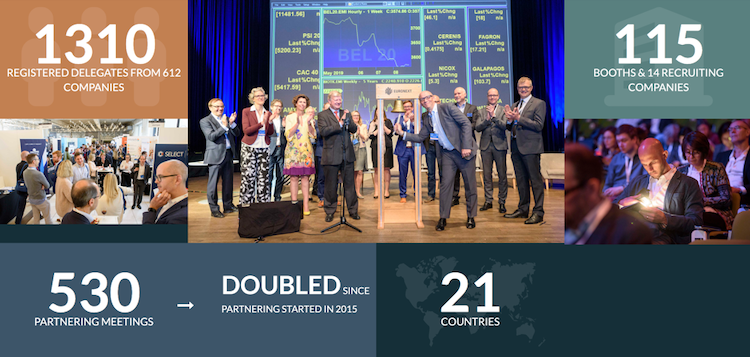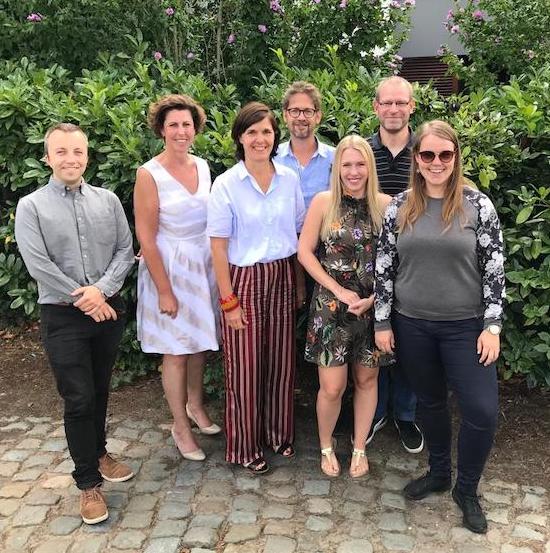Collaboration is vital for science. Without cross-pollination of ideas and talent, progress would be excruciatingly slow in both industry and academia. Networking opportunities, like the annual Knowledge for Growth event and Science for health, stimulate research collaboration by connecting people. So, what’s the role of a cluster organization in all this? BioVox spoke with flanders.bio representatives Pascale Engelen and Katrien Lorré to find out.
By Amy LeBlanc. Header image: the flanders.bio team (courtesy of flanders.bio).
An extensive network
Engelen and Lorré are both familiar figures in the Belgian life sciences ecosystem. As Co-General Manager and Program Manager respectively of flanders.bio, the women are well connected to the many different stakeholders that make up the blooming biotech industry in Belgium. Engelen explains the role of the organization:
“Flanders.bio was born out of a need for a group representing the interests of the biotech industry here in Flanders. The main reason for success in the region is that we have this very dense network of academia and companies. The government has also always been very supportive and of paramount importance in the growth of the sector.”
The flanders.bio team have been busy bees ever since the cluster organization was formed back in 2004. They are best known for organizing the annual spring event Knowledge for Growth, which has grown enormously from its humble beginnings fifteen years ago. The event now attracts over a thousand attendees from hundreds of different companies and is visited by international delegates who flock to Ghent to find out what the Belgian buzz is all about.

Image: Figures from this year’s Knowledge for Growth event (courtesy of flanders.bio).
Knowledge for Growth only happens once a year however: the other months of the year, Engelen, Lorré and their team are hard at work behind the scenes, constantly striving to strengthen the local ecosystem. Their activities are varied and include providing members with strategic advice, organizing activities and programs, and government advocacy. Arguably their most vital role is however as facilitators for partnering and connection between experts. Engelen agrees:
“Networking is a real cornerstone for flanders.bio: we bring people together from across the sector. Members will contact us and ask us for a certain expertise, and we put them in touch with the right partners in our network.”
The personal touch
In many ways, we are currently more in touch with each other than we have ever been before. Aided by an omnipresent online connection, most of us will have contact with dozens, if not hundreds, of people by the time we break for lunch. Of course, most of this interaction is done vicariously, through social media and email.
Meeting in person is still the best way for us to form personal and professional connections. It is why events like Knowledge for Growth and Science for health are so important: they bring people together. People who are all interested in a common goal: progress and innovation in the life sciences.
Read this previous BioVox article for more on the Science for health event.
So, do people really initiate collaborations and projects following networking events? Measuring direct outcomes is tricky, according to Engelen:
“It often takes six months to a year before a collaboration is officially established. Because of the confidentiality that surrounds a project before it is announced, it’s very hard to measure how many partnerships result from network events.
What we do know is that the partnering meetings at events are very well attended. Knowledge for Growth, had over 500 of them this year; which is more than double since we started the initiative in 2015.”
Gaining visibility on the international stage
Industry events have one more important role to play: they serve to showcase the local ecosystem to an international audience. These events bring Belgian companies and organizations into the spotlight in a big way.
“It’s one of the reasons we’re very excited about Science for health in September” says Lorré. “Knowledge for Growth started small but has become a real reference event for the Belgian life sciences, covering everything from research to talent and funding. Now we have Science for health, which is very complimentary to Knowledge for Growth and provides a real focus on a specific field of cutting-edge research. We think Science for health will also grow into a reference event, specifically for the exemplary research being conducted here in Belgium.”


